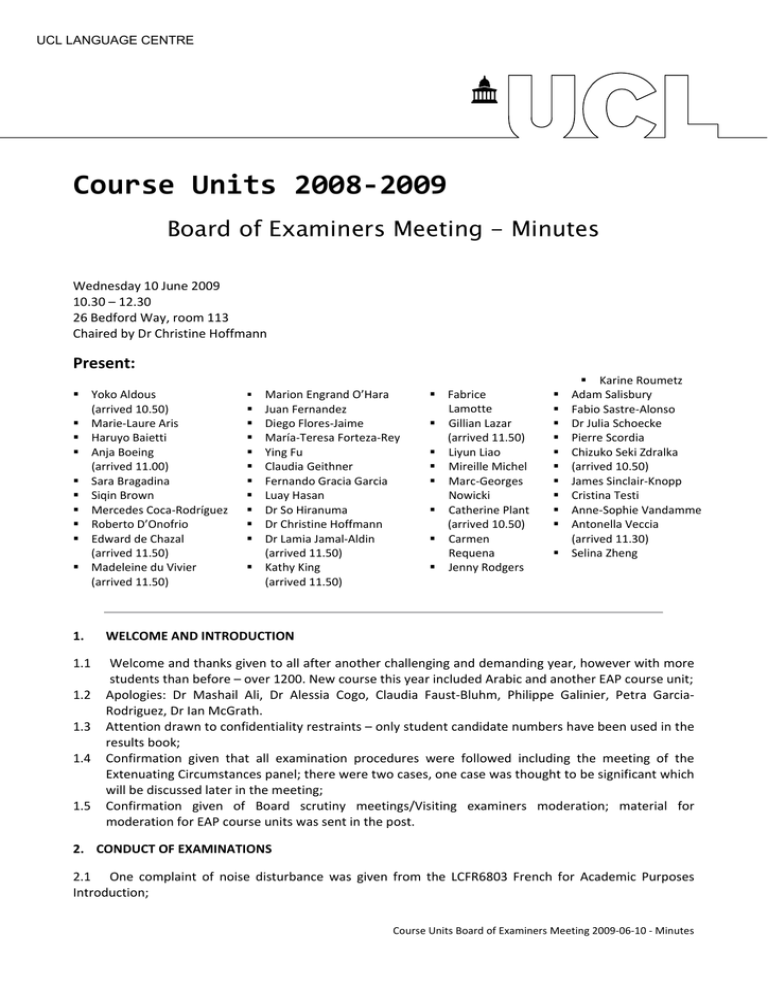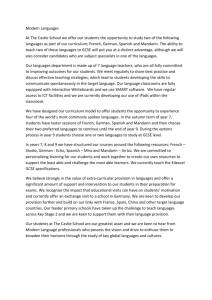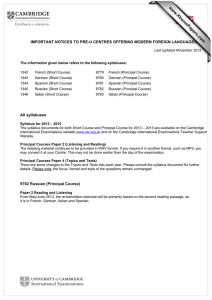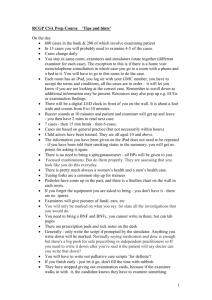Course Units 2008‐2009 Board of Examiners Meeting - Minutes Present:
advertisement

UCL LANGUAGE CENTRE Course Units 2008‐2009 Board of Examiners Meeting - Minutes Wednesday 10 June 2009 10.30 – 12.30 26 Bedford Way, room 113 Chaired by Dr Christine Hoffmann Present: Yoko Aldous (arrived 10.50) Marie‐Laure Aris Haruyo Baietti Anja Boeing (arrived 11.00) Sara Bragadina Siqin Brown Mercedes Coca‐Rodríguez Roberto D’Onofrio Edward de Chazal (arrived 11.50) Madeleine du Vivier (arrived 11.50) Marion Engrand O’Hara Juan Fernandez Diego Flores‐Jaime María‐Teresa Forteza‐Rey Ying Fu Claudia Geithner Fernando Gracia Garcia Luay Hasan Dr So Hiranuma Dr Christine Hoffmann Dr Lamia Jamal‐Aldin (arrived 11.50) Kathy King (arrived 11.50) Fabrice Lamotte Gillian Lazar (arrived 11.50) Liyun Liao Mireille Michel Marc‐Georges Nowicki Catherine Plant (arrived 10.50) Carmen Requena Jenny Rodgers Karine Roumetz Adam Salisbury Fabio Sastre‐Alonso Dr Julia Schoecke Pierre Scordia Chizuko Seki Zdralka (arrived 10.50) James Sinclair‐Knopp Cristina Testi Anne‐Sophie Vandamme Antonella Veccia (arrived 11.30) Selina Zheng 1. WELCOME AND INTRODUCTION 1.1 1.2 1.3 1.4 1.5 Welcome and thanks given to all after another challenging and demanding year, however with more students than before – over 1200. New course this year included Arabic and another EAP course unit; Apologies: Dr Mashail Ali, Dr Alessia Cogo, Claudia Faust‐Bluhm, Philippe Galinier, Petra Garcia‐ Rodriguez, Dr Ian McGrath. Attention drawn to confidentiality restraints – only student candidate numbers have been used in the results book; Confirmation given that all examination procedures were followed including the meeting of the Extenuating Circumstances panel; there were two cases, one case was thought to be significant which will be discussed later in the meeting; Confirmation given of Board scrutiny meetings/Visiting examiners moderation; material for moderation for EAP course units was sent in the post. 2. CONDUCT OF EXAMINATIONS 2.1 One complaint of noise disturbance was given from the LCFR6803 French for Academic Purposes Introduction; Course Units Board of Examiners Meeting 2009‐06‐10 ‐ Minutes 2.2 Student allowed to sit exam at the Language Centre after being contacted by the office, revealed they had got their exam date wrong; 2.3 One student for Arabic sat the exam for the wrong level – we do not know how this was allowed to happen, however this is to be investigated. 3. GENERAL COMMENTS Comments and observations from the Visiting Examiners 3.1 Dr Claudia Faust (German) comments received by email and read out by Dr Christine Hoffmann: The exam papers and coursework were all very impressive. They were quality papers with a variety of tasks which were appropriate for the level; 3.2 Dr Alessia Cogo (Italian) comments received by email and read out by Roberto D’Onofrio: Thanks to the office and congratulations to the team – the module content and assessment procedure was of a good standard; Very happy with the use of digital recordings for Oral exams, must easier to use; The previous format of the reading and writing exams was easier, with no separate answer book; 3.3 Dr Ian McGrath (Academic Writing in English for Non‐Native Speakers and English Language Skills) comments given in writing and read out by James Sinclair‐Knopp: The following points made about the marking grids used for these English courses and all Language Centre English for Academic Purposes courses: For the speaking assessment grid, under ‘Pronunciation’ to review the description of ‘Reasonable speaker’ and also include ‘stress and intonation’; For the writing assessment grid: review whether the marking scheme (which assumes competence in both register and text organisation and cohesion) is also suitable for low level proficient student; an alternative might be to establish a baseline of acceptability and reward incrementally for desirable features of the writing beyond this; There were some discrepancies between markers on the same piece of work, with regards to two areas: register, style and lexis and to grammatical accuracy; suggestion to separate register and linguistic range from linguistic accuracy; Review and reformat the marking grids so that the whole scale is available. 3.4 Marion Engrand O’Hara (French): It has been a great honour to work as VE for French for 5 years. It has been productive and the quality of the structure of the exams impressive. All members of staff have been responsive and after moderation it feels as though I have made a difference. Thanks to Mireille Michel for great team leadership and to the team for their flexibility. There is great effort to allow continuity, students can progress; New courses and developments each year is positive, e.g. French for Academic Purposes, Translation Skills; Good procedures in place, however more formalisation needed e.g. more information in Student Handbook; Great procedures for reflection on exam scripts, e.g. to reinforce solidarity and for marking discrepancies; Grammar and Vocabulary assessment is given at good time of year but format may not be appropriate in order to reflect student ability – marks not coherent with other marks. However the range and distribution of marks is good, fair and coherent; The tutors play a great role in motivating students and encouraging them to rise to the challenge; Assessment structure is from one level to the next, it is effective and well‐paced with a good balance of coursework and exams; The exams are rigorous, consistent and fair; The Language Centre has a good structure. Course Units Board of Examiners Meeting 2009‐06‐10 ‐ Minutes 3.5 Haruyo Baietti (Japanese): Congratulations to the team, to the office and to Christine for another successful year. It has been great to work with you for 4 years. The Oral exam and Project work linked well; The use of digital recordings for the Oral exam was excellent; The use of separate answer books for the final exams must have been difficult to mark, as some students did not always answer the questions chronologically; as far as languages are concerned it might be easier to use the old format; It is very important that students learn the script at an early stage; at Imperial students are assessed on this throughout the first term and progress appears to be much quicker; The Japanese, Mandarin and Arabic teams to consult each other on this. 3.6 Mercedes Coca‐Rodríguez (Spanish): Also the final year, there has been great team work between the office and the tutors. The exams are great with good, authentic material and are relevant and of a high standard. However using a separate answer book is not good for the students: Students can get the questions mixed up when answering; They sometimes copy the question into the answer book; One student did not have time to answer the final question, when the rest of their work was indicative of grade A; One solution is that the final question could be answered on a separate sheet, but the reading comprehension tasks need to be in the same book to avoid confusion. 3.7 Ying Fu (Mandarin): First year as Examiner; the office have been a great help and have gone through the procedures. The standard of work is good – thanks to the Mandarin team. Good assessment pattern with a mixture of coursework and exams – important that coursework is assessed; Could borderlines be avoided before Visiting Examiner moderation? Work must be marked as normal and any borderline cases be passed to the Visiting Examiner for consideration. 3.8 Dr Mashail Ali (Arabic): comments received by email and read out by Dr Christine Hoffmann: As first year as Visiting Examiner policies and procedures were received well in advance. Student Guidelines were very well produced. There is evidence of effective teaching of a high standard; marking is fair and consistent with a good spread of marks: The 2nd marking was exemplary, very thorough and rigorous; Both examiners recorded their marks per tasks and not per item – it would be useful for the marks for individual items within a task to be stated explicitly and not just those for the total task; Marks awarded should be balanced with the distribution of marks available for the various aspects of a task (e.g. style and register); marks awarded by the marker should not exceed the marks allocated for a certain aspect of the task; Markers should sometimes make comments on the script to ensure there is constructive dialogue between 1st and 2nd marker and to justify marks; It would also be helpful for markers to make comments on the cover/marker sheet; Tutors must adhere to the guidelines given to students to avoid future possible complaints: the Project Guidelines clearly state that, “a bibliography of ALL relevant sources you have read (Including FULL internet addresses)” be included with the Project – students of one tutor did not include a bibliography or sources and were not penalised. In some cases the marks allocated for this were carried over to other sections. While students of another tutor did correctly include a bibliography and copies of sources used with the relevant sections highlighted; Course Units Board of Examiners Meeting 2009‐06‐10 ‐ Minutes There were some students whose level in the language was higher than the level of the course – 3 students in particular in level B and level C were all native speakers with very high command of the language. The project submitted by one of them was at C2 level on the Common European Framework Reference (at their level they should be approximately B1); All marks approved except for 4 cases: Candidate KKQN0 (LCAR6001): the content of the Project was almost identical to the writing section of the final exam. The same content was also in part of the Oral exam. As they did not demonstrate that learning had taken place since throughout the course and they made no effort to change the content when they overlapped, should the writing exam mark be reduced? However they should have also been encouraged to use a different project topic to that used in the final exam paper; Candidate JXJG2 (LCAR6012): For task 6 of the final exam they do not answer the question, instead they write about a past holiday, also with a lot of repetition from the project. The mark is currently 20, this should be changed to 14; Candidate from LCAM6002: For the Project no bibliography was included and the sources not attached. The current mark of 77 is too high and a lower mark of 70 would be fairer, considering they have not stuck to the guidelines, when their peers have; Candidate from LCAM6001: For the Project the mark is currently 72 which is too high as no bibliography was included and no sources submitted. A mark of 60 would be fairer and more in line with the marks for the whole group. 4. Comments and observations from Course Units Language Coordinators: 4.1 Mireille Michel (French): All courses ran this year. Thanks to Christine Hoffmann for allowing Marion to act as Visiting Examiner for 5th year – her academic rigour has challenged us; we will keep an academic relationship. Thanks to the team for their availability, enthusiasm and professionalism; 4.2 Anja Boeing (German): All courses ran in German. The new course, Translation Skills had a good and very interesting exam paper. Thanks to our new colleague Dr Julia Schoeke and to our Visiting Examiner for her very detailed comments; 4.3 Roberto D’Onofrio (Italian): All courses ran, although some were with small groups – great that we could allow these to run. There were two new courses, Art Historians and Translation Skills, both of which had good progress. We had a very positive response from the Moodle site, where students could practice the skills they have learnt. We screened an Italian film once a month that students also benefitted from, which had a good turnout. Thanks to the team who had a professional standard 4.4 Dr So Hiranuma (Japanese): Thanks to all, including Haruyo Baietti who has been the Visiting Examiner for 4 years; we are grateful for her suggestions as and a result have modified the orals and the assessment structure. This year we introduced back‐up (revision) classes for levels A and B, which has been a huge success and the students have clearly achieved more, especially level B. We minimised sharing levels and classes between tutors, which proved to be much better. 4.5 Luay Hasan (Arabic): This was the first year for Arabic course units and there were good numbers – x47 across three levels. It has been difficult to take on the role of Coordinator and there is a lot of room for improvement for next year. 4.6 Fernando Gracia‐Garcia (Spanish): Thanks to the team, to Mercedes and to Christine. There has been one new course, Translation Skills which has been successful. Juan Fernandez has been focusing on the web based material and learning, in particular Moodle. 4.7 Dr Christine Hoffmann (Mandarin): After a challenging year thanks to the Mandarin team. Students have progressed and results are great. Course Units Board of Examiners Meeting 2009‐06‐10 ‐ Minutes 4.8 James Sinclair‐Knopp (English for Academic Purposes): Thanks to the team, it has been a successful year. There has been a mixture of students from all years, as well as some Erasmus. The new course (English Language Skills) did not seem to affect numbers on the Academic Writing course. Exam scripts were marked by EAP Coordinators – it is interesting to compare EAP and Course Units exams. The Visiting Examiner comments were helpful and detailed and there are some points that the team need to look at. 4.9 Madeleine du Vivier (TEFL): Thanks to the team. The assessment procedures were fair and rigorous and the team gave great quality of feedback. It has been an interesting year with just 11 students, half the number we usually have. This year we taught how to test students and, based on feedback from the Visiting examiner we changed how we marked assignments, as well as the weighting for the teaching practice. For 2009‐2010 we intend to give feedback on teaching practice. 5. CONFIRMATION OF COURSE UNITS RESULTS 5.1 AS explained Referred Assessment to all, whereby continuing students on the new harmonised scheme, where they have gained a mark between 35% and 39% will be given an additional (supplementary) assessment over the summer in order to give the Board of Examiners the information it needs to make a pass/fail judgement on the student’s overall performance in that module. Should the student choose to take the referred assessment and pass, they will be awarded a mark of 40; or they can refuse the offer of referred assessment and re‐enter at the next normal opportunity, if all re‐sit attempts have not already been used, and gain the actual mark gained. We will offer any such assessments in the middle of September 2009. AS explained the procedures for categorising Extenuating Circumstances it was noted that it is 5.2 normal procedure to not change marks unless they are borderline. We will discuss and confirm any cases as we reach the relevant course. 5.3 SYLLABUS A: Arabic, French, German, Italian, Japanese, Mandarin and Spanish 0.5 Course Units LCAR6001 Results approved; LCFR6001 Results approved; LCGE6001 Results approved; LCIT6001 Results approved; LCJA6001 Results approved; LCMA6001 Results approved; LCSP6001 Results approved. LCFR6001: Extenuating Circumstance, category 1 given to candidate LCCV3; LCSP6001: raised by the team that there is a decrease in fails this year. 5.4 SYLLABUS B French, German, Italian, Japanese, Mandarin and Spanish 0.5 and 1.0 Course Units LCAR6002 Results approved; LCFR6002 Results approved; LCGE6002 Results approved; LCIT6002 Results approved; LCJA6002 Results approved; LCMA6002 Results approved; LCSP6002 Results approved. LCAR6012 Results approved; LCFR6012 Results approved; LCGE6012 Results approved; LCIT6012 Results approved; LCJA6012 Results approved; LCMA6012 Results approved; LCSP6012 Results approved LCAR6012: Candidate LSLP4 sat the incorrect Reading and Writing exam, that of the beginners 0.5 unit (LCAR6001); there are two options: To award an overall result of 56%, this includes the mark for the exam; To calculate the result based only on the other four elements of the course (ignoring the 35% weighting of the exam) All agreed that candidate’s result should be based only on marks for all other components taken (out of 65%). Candidate therefore receives an overall result of 49% LCMA6012: Mandarin tutor questioned a borderline mark and whether this could be raised: Confirmation was given that the Visiting Examiner has already moderated and reviewed such cases and would have done so if felt appropriate. 5.5 SYLLABUS C French, German, Italian, Japanese, Mandarin and Spanish 0.5 Units Course Units Board of Examiners Meeting 2009‐06‐10 ‐ Minutes Arabic, French, German, Italian, Japanese, Mandarin and Spanish 1.0 Course Units LCFR6003 Results approved; LCGE6003 Results approved; LCIT6003 Results approved; LCJA6003 Results approved; LCMA6003 Results approved; LCSP6003 Results approved; LCAR6023 Results approved; LCFR6023 Results approved; LCGE6023 Results approved; LCIT6023 Results approved; LCJA6023 Results approved; LCMA6023 Results approved; LCSP6023 Results approved. 5.6 Academic Purposes – Introduction French 0.5 Course Unit LCFR6803 Results approved 5.7 SYLLABUS D French, German, Italian, Mandarin and Spanish 0.5 Units French, German, Italian and Spanish 1.0 Course Units LCFR6004 Results approved; LCGE6004 Results approved; LCIT6004 Results approved; LCMA6004 Results approved; LCSP6004 Results approved; LCFR6034 Results approved; LCGE6034 Results approved; LCIT6034 Results approved; LCSP6034 Results approved. LCSP6004: Extenuating Circumstances, Category 2 given to Candidate KLHBO. Candidate did not submit Project coursework and requested an extension after the deadline had passed; has now submitted some of the Project. They have also not taken the Oral exam yet, so cannot complete the course. There are two options: They resit as normal in the next academic session; We allow them to fully submit the Project and take the Oral exam this year. After discussion all agreed candidate should resit at the next normal opportunity, therefore the result remains as AB (absent, as they missed an exam and 50% of coursework). LCSP6034: Noted that two candidates have a good overall result but failed the Reading and Writing exam – should their overall mark be reduced? Confirmed that marks will not be changed now – all other marks throughout the year are consistent with overall grade. 5.8 BUSINESS AND CURRENT AFFAIRS French, German, Italian, Japanese, Mandarin and Spanish 0.5 and 1.0 Course Units LCFR6005 Results approved; LCGE6005 Results approved; LCIT6005 Results approved; LCJA6005 Results approved; LCMA6005: Results approved; LCSP6005 Results approved; LCFR6045 Results approved; LCGE6045Results approved; LCIT6045 Results approved; LCJA6045 Results approved; LCMA6045 Results approved; LCSP6045 Results approved. Candidate LCCK4 has applied for Deferred Assessment, so overall result is LA. 5.9 CURRENT AFFAIRS AND CULTURE French, German, Italian and Spanish 0.5 Course Units French, German, Italian, Japanese and Spanish 1.0 Course Units LCFR6006 Results approved; LCGE6006 Results approved; LCIT6006 Results approved; LCSP6006 Results approved; LCFR6056 Results approved; LCGE6056 Results approved; LCIT6056 Results approved; LCJA6056 Results approved; LCSP6056 Results approved. 5.10 PROFESSIONAL PURPOSES II French, German, Italian and Spanish 0.5 Course Units French, German, Italian, Japanese and Spanish 1.0 Course Units LCFR6007 Results approved; LCGE6007 Results approved; LCIT6007 Results approved; LCSP6007 Results approved; LCFR6067 Results approved; LCGE6067 Results approved; LCIT6067 Results approved; LCJA6067 Results approved; LCSP6067 Results approved. Course Units Board of Examiners Meeting 2009‐06‐10 ‐ Minutes 5.11 ACADEMIC PURPOSES II French, German, Japanese and Spanish 0.5 Course Units French and German 1.0 Course Units LCFR6807 Results approved; LCGE6807 Results approved; LCJA6807 Results approved; LCSP6807 Results approved; LCFR6867 Results approved; LCGE6867 Results approved; LCSP6867 Results approved. 5.12 FRENCH FOR ART HISTORIANS 0.5 COURSE UNIT LCFA6801 Results approved 5.13 ACADEMIC WRITING IN ENGLISH FOR NON‐NATIVE SPEAKER’S 0.5 COURSE UNIT LCEN6801 Results approved 5.14 TEACHING ENGLISH AS A FOREIGN LANGUGE 1.0 COURSE UNIT LCTE7900 Results approved 6. CONFIRMATION OF SSC RESULTS 6.1 SYLLABUS A Arabic, French, Italian, Japanese, Mandarin and Spanish SSC’s All results approved 6.2 SYLLABUS B Arabic, French, Japanese, Mandarin and Spanish SSC’s All results approved 6.3 SYLLABUS C French and Spanish SSC’s All results approved 6.4 SYLLABUS D French and Spanish SSC’s All results approved 6.5 BUSINESS AND CURRENT AFFAIRS French, German and Spanish SSC’s All results approved 6.6 BUSINESS AND CURRENT AFFAIRS (HIGHER) Spanish SSC’s Result approved 6.7 PROFESSIONAL PURPOSES II French SSC’s All results approved 7. DATES FOR 2009‐2010 7.1 Board of Examiners meeting: Wednesday 09 June 2010 (provisional) 8. ANY OTHER BUSINESS 8.1 Confirmation given of Visiting Examiners who will extend their service to next year (for German and Italian). Meeting closed at 12:30 Course Unit Administrative Assistant +44 (0)20 7679 5481 24 June 2009 Course Units Board of Examiners Meeting 2009‐06‐10 ‐ Minutes




